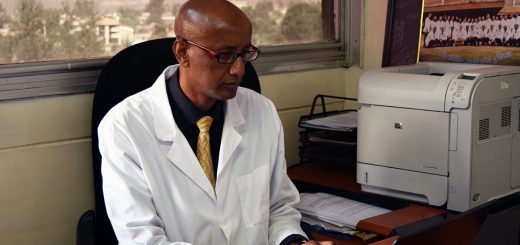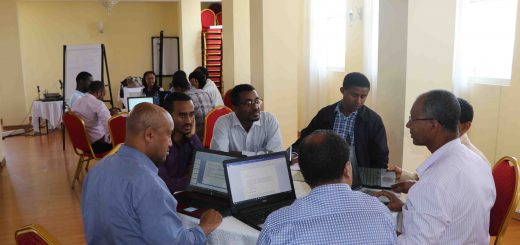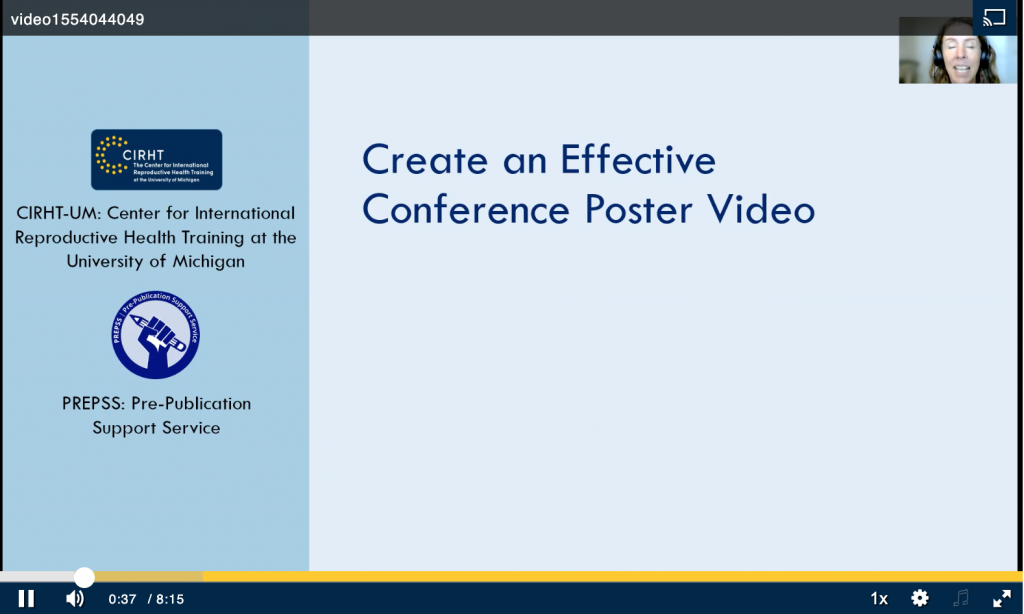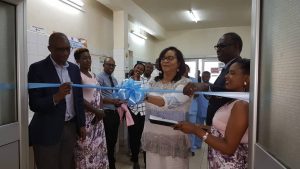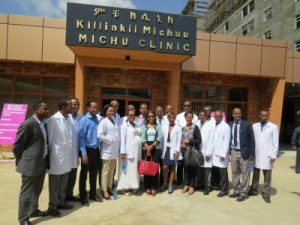Family Planning course “Boot Camp” breaks new ground in Ethiopia

Feiruz Surur, head of the department of OB/Gyn at St. Paul’s Hospital Millennium Medical College in Addis Ababa, Ethiopia, reviews his notes, squints into the bright lights and prepares to give his lecture. But he is not in a classroom. Rather he is in a small make-shift TV studio, staring into a camera and ready to address an unknown future audience in cyberspace.
Locally-produced online academic material is rare in Ethiopia and for multimedia curricula, it is almost non-existent. For three days at a training facility in the cool hills outside the city, OB/Gyn faculty and support staff from five Ethiopian universities, the Center for International Reproductive Health Training (CIRHT) and the University of Michigan gathered to break that barrier and create a digital course on the basics of Family Planning. It was intense, hard work, performed by a collegial and highly-motivated group who understood the importance of the task – not just for the coursework itself but for its wider implications. The academic “Boot Camp” resulted in an eight-part multimedia tool, which can be used in conjunction with classroom learning at medical schools and health science colleges across the country.
The CIRHT team decided to develop the multimedia resource in a Boot Camp setting because of the urgent need across institutions to implement integrated Family Planning curricula. Solomon Worku Beza, the director for medical education and training at CIRHT Ethiopia who led the Boot Camp said, “Electronic education material development is entirely new to this country and we are doing it for the first time.”
CIRHT works with 10 medical schools across the country to help expand their Family Planning (FP) and Reproductive Health (RH) capacity for teaching, research and clinical service. Helping the schools align their curricula is at the core of that mission. “These days we are having interaction between universities, especially through the support of CIRHT. In previous times most universities were separate and the medical schools did their own jobs in their own style,” according to participant Zenebe Wolde from Hawassa University.
Joining the Ethiopian academics were Chris Chapman, assistant director, learning design and publishing, from the U-M Health System, and Daniel Rivkin, senior communications specialist from CIRHT, who outlined instructional design and editorial concepts that were applied to the medical information to make the classwork consistent and seamless.
Each professor arrived with a course plan on a specific topic, which they presented to the group for refinement. Once the slides were agreed, they went on to record video introductions and narration, which again were reviewed by the group. Each finished topic, of about 25 minutes, will be available to students across the country by a variety of technical means including the U-M’s Canvas online learning platform.
Chapman has produced numerous online courses and educational videos, but said this experience was unique. “I was really impressed with the way that everybody was sharing their slides, critiquing the work, and adding to the content so we all were on the same page on the integrated curriculum. At Michigan we try to do that but I’ve never seen an example like this where they actually interactively created together and revised.”
Woubishet Girma from Jimma University, approached the week with some trepidation. “When we heard about this ‘Boot Camp’ for the first time, I looked it up in the dictionary. I mean ‘What is it?’ But now that I have lived it, I see it is a very important thing that we have done. We have learned not just about the electronic media and recording my lectures, but also other things that can be replicated in my courses.”
The Boot Camp produced a tangible result in the multimedia course, but also planted the seed for more innovation in FP and RH instruction. Mulat Adefris from Gondar University said he is motivated by this first experience. “This will be part of the development of education in our field for the future.”
And the effect won’t just be felt in Ethiopia. Chapman observed that on instructional design, “They did a great job on something that we struggle with at Michigan. I think I can take back some lessons about our processes, about the templates and the formats, as well as the working together, which was awesome.”
The success of the Boot Camp will certainly lead to follow-ups. “The team here did a great job creating something that will be useful to our students. Hopefully this is only the first of many such experiences,” said Beza.

